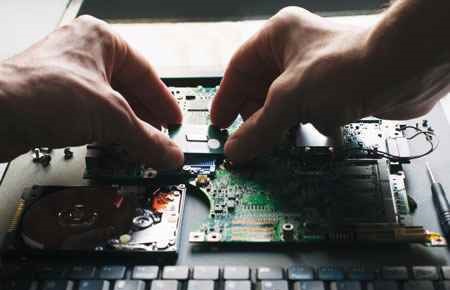
Computer Hardware Engineer
Summary
Computer hardware engineers research, design, develop, and test computer systems and components.
What they do
Computer hardware engineers research, design, develop, and test computer systems and components such as processors, circuit boards, memory devices, networks, and routers.
Computer hardware engineers typically do the following:
- Design new computer hardware, creating schematics of computer equipment to be built
- Test the computer hardware they design
- Analyze the test results and modify the design as needed
- Update existing computer equipment so that it will work with new software
- Oversee the manufacturing process for computer hardware
Many hardware engineers design devices used in manufactured products that incorporate processors and other computer components and that connect to the Internet. For example, many new cars, home appliances, and medical devices have Internet-ready computer systems built into them.
Computer hardware engineers ensure that computer hardware components work together with the latest software. Therefore, hardware engineers often work with software developers. For example, the hardware and software for mobile phones and other devices frequently are developed at the same time.
Work Environment
Most computer hardware engineers work full time.
How to become a Computer Hardware Engineer
Most computer hardware engineers need a bachelor’s degree from an accredited computer engineering program.
Most entry-level computer hardware engineers have a bachelor’s degree in computer engineering, although a degree in electrical engineering or computer science also is generally acceptable. A computer engineering major is similar to a major in electrical engineering but with a heavy emphasis on computer science.
Many engineering programs are accredited by ABET. Employers may prefer candidates who have graduated from an accredited program. To prepare for a major in computer or electrical engineering, students should have a solid background in math and science.
Because hardware engineers commonly work with computer software systems, a familiarity with computer programming is usually expected. This background may be obtained through computer science courses.
Some large firms or specialized jobs may require a master’s degree in computer engineering. Some experienced engineers obtain a master’s degree in business administration (MBA). All engineers must continue their learning over the course of their careers in order to keep up with rapid advances in technology.
Pay
The median annual wage for computer hardware engineers was $117,220 in May 2019. The median wage is the wage at which half the workers in an occupation earned more than that amount and half earned less. The lowest 10 percent earned less than $68,460, and the highest 10 percent earned more than $185,240.
Job Outlook
Employment of computer hardware engineers is projected to grow 2 percent from 2019 to 2029, slower than the average for all occupations.
Demand for these engineers is expected to grow as more industries outside of the computer and electronic product manufacturing industry begin to research and develop their own electronic devices. However, centralized computing and networking services may mean fewer engineers will be needed because these worksites cover large networks and geographic areas.
Similar Job Titles
Design Engineer, Engineer, Field Service Engineer, Hardware Design Engineer, Hardware Engineer, Network Engineer, Project Engineer, Senior Hardware Engineer, Systems Engineer, Systems Integration Engineer
Related Occupations
Computer Systems Analyst, Software Developer-Systems Software, Database Administrator, Computer Network Architect, Computer Systems Engineer/Architect
More Information
The trade associations listed below represent organizations made up of people (members) who work and promote advancement in the field. Members are very interested in telling others about their work and about careers in those areas. As well, trade associations provide opportunities for organizational networking and learning more about the field’s trends and directions.
- American Society for Engineering Education
- Association for Computing Machinery
- CompTIA
- Institute of Electrical and Electronics Engineers (IEEE)
- IEEE Computer Society
- Information Systems Audit and Control Association (ISACA)
- National Society of Professional Engineers
- Society of Women Engineers
Magazines and Publications
- Journal of Computer Hardware Engineering
- E&T Magazine (Computer Hardware)
- IEEE Computer Magazine
- PC Mag
With each passing day, we spend more time on computers and expect them to meet more complex needs. Computer hardware engineers have a leading role in the research on, and development of, advanced computer technology, and even influence how it's used. Computer hardware engineers research, design, and test computer systems and components such as processors, circuit boards, memory, and storage media. In most cases, the goal of computer hardware engineers is to discover ways to make computers faster and more powerful. Some more specialized engineers design other devices that incorporate computers- like cars and medical equipment. Some work closely with software developers to design phones, tablets, and other devices. Computer hardware engineers need to be creative problem-solvers, and work well as a member of a team... using their powers of reason to find original solutions. Usually, computer hardware engineers have a bachelor's degree in computer engineering, though degrees in electrical engineering or computer science are also accepted. Some positions require a master's degree. Many employers expect computer hardware engineers to have at least some familiarity with software. In this fast-moving millennium, few shape our information world like computer hardware engineers.
Content retrieved from: US Bureau of Labor Statistics-OOH www.bls.gov/ooh,
CareerOneStop www.careeronestop.org, O*Net Online www.onetonline.org